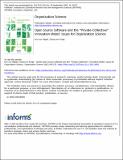Open Source Software and the “Private-Collective” Innovation Model: Issues for Organization Science
Author(s)
von Hippel, Eric A; Krogh, Georg von
Downloadorsc.14.2.209.14992.pdf (235.0Kb)
Publisher with Creative Commons License
Publisher with Creative Commons License
Creative Commons Attribution
Terms of use
Metadata
Show full item recordAbstract
Currently, two models of innovation are prevalent in organization science. The “private investment” model assumes returns to the innovator result from private goods and efficient regimes of intellectual property protection. The “collective action” model assumes that under conditions of market failure, innovators collaborate in order to produce a public good. The phenomenon of open source software development shows that users program to solve their own as well as shared technical problems, and freely reveal their innovations without appropriating private returns from selling the software. In this paper, we propose that open source software development is an exemplar of a compound “private-collective” model of innovation that contains elements of both the private investment and the collective action models and can offer society the “best of both worlds” under many conditions. We describe a new set of research questions this model raises for scholars in organization science. We offer some details regarding the types of data available for open source projects in order to ease access for researchers who are unfamiliar with these, and also offer some advice on conducting empirical studies on open source software development processes.
Description
A version of this paper with a different license is available in the MIT Open Access Articles collection at https://dspace.mit.edu/handle/1721.1/106296.
Date issued
2003-04Department
Sloan School of ManagementJournal
Organization Science
Publisher
Institute for Operations Research and the Management Sciences (INFORMS)
Citation
von Hippel, Eric and Georg von Krogh. "Open Source Software and the “Private-Collective” Innovation Model: Issues for Organization Science." Organization Science 14, 2 (April 2003): 107-225 © 2003 INFORMS
Version: Final published version
ISSN
1047-7039
1526-5455